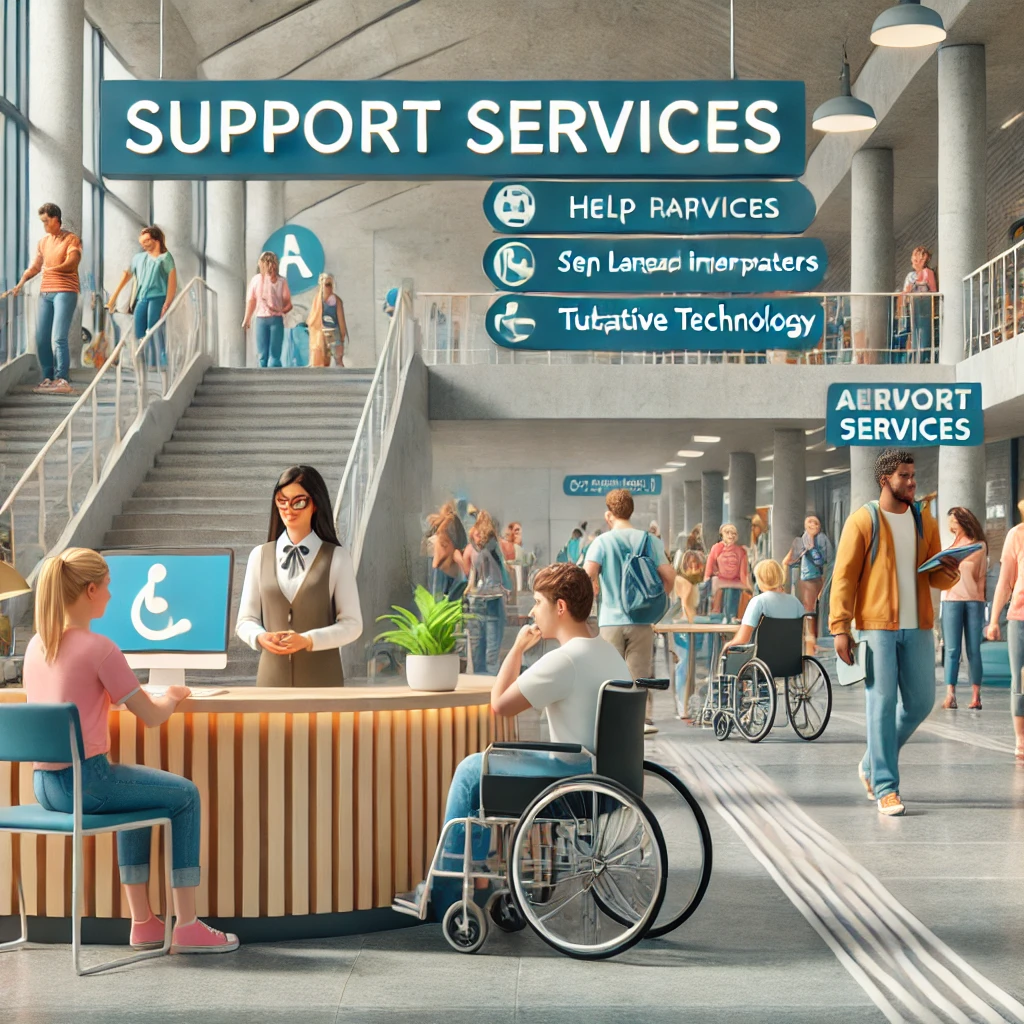Attending university is a life-changing experience for many students. However, for disabled students, navigating the academic landscape can present unique challenges. Universities around the world have recognized the importance of providing inclusive environments, which has led to the development of various support services tailored specifically to the needs of disabled students. These services aim to ensure equal access to education, foster independence, and support academic success.
In this article, we will explore the various types of support services available to disabled students in universities, how they can benefit from these services, and what steps they can take to access them.

Types of Support Services for Disabled Students
Universities offer a wide range of services to accommodate the diverse needs of disabled students. These services typically cover physical, academic, and emotional support. Here’s a detailed overview:
- Disability Resource Centers
Most universities have a dedicated Disability Resource Center (DRC) or Office for Students with Disabilities. These centers serve as a central hub where students can register for accommodations and receive guidance on academic and campus resources.
- Role of DRC: Evaluating students’ needs, helping them apply for accommodations, providing assistance with documentation, and acting as a liaison between students and faculty.
- Common Services Offered: Note-taking assistance, extended test times, and alternative formats for textbooks.
Academic Accommodations
To ensure that students with disabilities can perform to their full potential, universities provide specific academic accommodations, which can include:
- Extended Time on Exams: Students with disabilities such as learning differences or attention disorders may need extra time to complete exams.
- Accessible Course Materials: Providing materials in accessible formats, including Braille, large print, or digital formats compatible with screen readers.
- Priority Registration: Disabled students often receive priority when it comes to registering for classes, ensuring they can choose courses that fit their unique needs.
- Tutoring and Learning Support: Personalized tutoring sessions to help students with disabilities succeed academically.
Physical Accessibility
Universities work to make their campuses physically accessible for students with mobility challenges. Common services and adaptations include:
- Accessible Buildings: Ramps, elevators, and automatic doors ensure that students can easily navigate campus facilities.
- Transportation Services: Some universities provide transportation services such as wheelchair-accessible shuttles or golf carts to help students move between buildings.
- Adaptive Equipment: Tools such as specialized chairs, desks, and hearing devices are often available for students who require them.
Assistive Technology
Universities invest in various assistive technologies to support disabled students in their academic work. Some popular tools include:
- Screen Readers: For visually impaired students, screen readers convert digital text into audio.
- Speech-to-Text Software: Helps students with physical disabilities or learning challenges convert spoken words into written text.
- Adaptive Keyboards and Mice: For students with mobility impairments, these devices make computer use more accessible.
Mental Health and Counseling Services
Many students with disabilities may experience mental health challenges, including anxiety or depression, which can be exacerbated by the pressures of university life. Universities offer:
- Counseling and Therapy: Regular access to licensed therapists who understand the unique struggles disabled students face.
- Peer Support Programs: Initiatives that connect disabled students with others who share similar experiences, offering a sense of community and mutual support.
Housing Accommodations
On-campus housing is another area where universities provide specific accommodations for disabled students. Examples include:
- Accessible Dorm Rooms: Equipped with features like wider doorways, roll-in showers, and adjustable furniture.
- Service Animals: Policies that allow students to live with service animals or emotional support animals.
Benefits of Support Services
The benefits of these university services extend beyond academics. Here’s how they positively impact disabled students’ overall college experience:
- Enhanced Academic Success: With appropriate accommodations, students are more likely to perform well in their studies and meet their academic goals.
- Increased Independence: Support services allow students to navigate campus life more independently, boosting their confidence.
- Inclusive Campus Environment: Access to resources and accommodations fosters a sense of belonging and inclusion, helping students engage more fully in university life.
- Personal Growth: Through access to support services, students develop problem-solving skills, self-advocacy, and resilience, preparing them for post-graduation life.
How to Access University Support Services
Accessing these services requires students to be proactive. Here are the steps most universities require:
- Self-Identification: Students must disclose their disability to the university, typically through the Disability Resource Center.
- Documentation: Providing documentation from a healthcare provider or specialist outlining the disability and its impact on academic performance.
- Meeting with Advisors: Students usually meet with a disability advisor who helps design a personalized plan outlining the accommodations and services available.
- Ongoing Communication: It’s important for students to maintain communication with professors, the disability office, and other relevant departments to ensure that accommodations are being properly implemented.
Additional Resources for Disabled Students
Many external organizations also provide resources and support for disabled students in higher education:
- Scholarships and Financial Aid: Disabled students may qualify for specialized scholarships that help cover tuition and other costs.
- Career Counseling: Some universities offer tailored career services to help disabled students navigate the job market post-graduation.
- Advocacy Groups: Organizations like the National Federation of the Blind or the American Association of People with Disabilities (AAPD) offer additional support, advocacy, and community connections.
Conclusion
University life presents both opportunities and challenges for disabled students. However, with the growing availability of support services, disabled students can thrive academically, socially, and personally. Whether it’s through academic accommodations, accessible campus facilities, or mental health support, universities are increasingly committed to fostering an inclusive and supportive environment for all students.
If you’re a disabled student preparing for university or currently enrolled, it’s essential to explore these resources and take advantage of the support available to ensure your academic journey is successful and enriching.